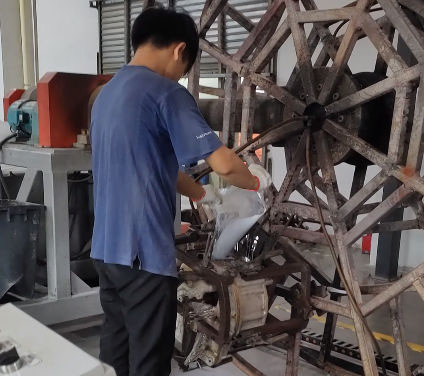Resin Material Requirements for Rotational Molding Process
 Feb 28,2024
Feb 28,2024

Resin Material Requirements for Rotational Molding Process
The rotational molding process demands meticulous attention to material selection to ensure the production of high-quality, durable products. Several critical factors, including resin type, material properties, melting and flow characteristics, processability, drying requirements, and material certification, must be thoroughly evaluated.

1. Resin Type:
Thermoplastic resins, such as polyethylene (PE), polypropylene (PP), and nylon, are commonly utilized in rotational molding. The selection of the resin is based on the desired characteristics of the final product, which may include chemical resistance, impact strength, temperature tolerance, and UV stability. Choosing the correct resin type is vital for attaining the desired product quality and performance.
2. Material Properties:
The resin's material properties should align with the specific needs of the application. Properties such as tensile strength, impact resistance, heat resistance, and chemical resistance must be taken into account. It is essential to ensure that the chosen resin possesses the required properties to withstand the anticipated operating conditions and fulfill the desired functionalities.
3. Melting and Flow Properties:
The melting and flow properties of the resin are instrumental in achieving consistent wall thickness and dimensional accuracy in rotational molded parts. Factors such as melt flow index (MFI) and viscosity at different temperatures should be carefully considered. A resin with suitable MFI and viscosity ensures uniform melting and flow during the rotational molding process, leading to high-quality products.
4. Processability:
The resin should exhibit good processability to ensure efficient and uniform rotational molding. Compatibility with additives, pigments, and other fillers should be assessed. Additionally, the resin's ability to retain its quality and properties during processing and storage is crucial.
5. Drying Requirements:
Certain resins may necessitate pre-drying to eliminate any moisture absorbed during storage. Excess moisture can result in defects like bubble formation and poor inter-layer adhesion. Ensure that the resin is properly dried before processing, following the recommended drying conditions provided by the supplier.
6. Material Certification:
Obtain material certification from the supplier, which provides detailed information about the resin's properties, including its chemical composition, melt flow rate, density, and shelf life. Verify that the material meets the specified requirements and industry standards. Ensure that the certification is current and applicable to the specific batch of material being used.
Compliance with these material requirements and the careful selection of the right resin are pivotal to the successful rotomolded products that meet the desired quality standards and performance expectations. At Light Venus, we stand ready to provide you with comprehensive support to address any inquiries you may have. Our team of industry-leading technical experts is dedicated to guiding you through the process. Do not hesitate to reach out to us for further information or to explore the range of custom rotational molding services we offer.
 Tel: 0086-13632687993
Tel: 0086-13632687993  Email: roto@lightvenus.com
Email: roto@lightvenus.com

 Home
Home Steps for Structural Inspections in Rotational Molding Process
Steps for Structural Inspections in Rotational Molding Process  You May Also Like
You May Also Like



 Tel
Tel
 Email
Email
 Address
Address








